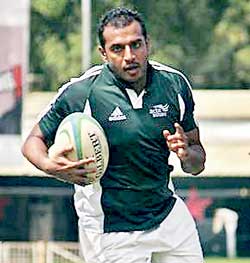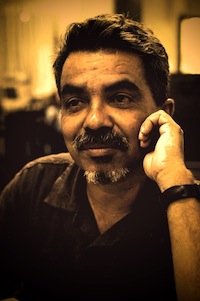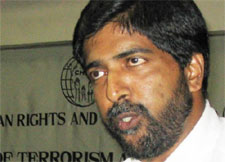 Next Monday, 10 August 2015, the body of the well-known rugby player and Havelock’s Captain, Wasim Thajudeen, will be exhumed on the orders of the Colombo Additional Magistrate. The Magistrate made this order on the basis of an application by the Criminal Investigations Division, which submitted reports stating that newly available evidence suggests that Thajudeen’s death was caused by murder. Three Judicial Medical Officers will conduct the examination of the exhumed body of Wasim Thajudeen.
Next Monday, 10 August 2015, the body of the well-known rugby player and Havelock’s Captain, Wasim Thajudeen, will be exhumed on the orders of the Colombo Additional Magistrate. The Magistrate made this order on the basis of an application by the Criminal Investigations Division, which submitted reports stating that newly available evidence suggests that Thajudeen’s death was caused by murder. Three Judicial Medical Officers will conduct the examination of the exhumed body of Wasim Thajudeen.
The Asian Human Rights Commission (AHRC) understands that extensive investigations have been conducted into this case. The investigations have revealed extensive details about the manner in which this alleged murder has taken place, including details about the abduction; the injuries caused to Thajudeen, which led to his death; the manner in which a fabricated crime scene was constructed, to create the impression of death by accident; as well as details of the persons involved in the murder, including the masterminds.
The initiative taken by the Criminal Investigation Division to reinvestigate the alleged murder marks a new beginning in Sri Lanka, where, for several years, investigation into allegations of serious crimes including murder, enforced disappearances, abductions, and the like, have been hushed up, particularly when there is suspicion of politicians or their relatives being involved in such crimes.
 There are long lists of such cover-ups; prominent cases include the daylight assassination of Lasantha Wickramatunge, the abduction and disappearance of Prageeth Eknaligoda, the assassination of former Tamil National Alliance Member of Parliament, Nadarajah Raviraj.
There are long lists of such cover-ups; prominent cases include the daylight assassination of Lasantha Wickramatunge, the abduction and disappearance of Prageeth Eknaligoda, the assassination of former Tamil National Alliance Member of Parliament, Nadarajah Raviraj.
The AHRC also learned that some important breakthroughs have also been made into the abductions and the disappearance of Prageeth Eknaligoda and regarding the assassination of former TNA MP Raviraj.
 For over two decades, the Asian Human Rights Commission, together with many other organisations, has warned that the administration of criminal justice has been seriously paralysed in Sri Lanka due to political reasons. The AHRC has also consistently warned that the political scheme unleashed by the 1978 Constitution and the paralysis of the criminal justice administration is linked. Furthermore, the AHRC has consistently communicated that the the paralysis of the criminal justice system will necessarily cause a breakdown of the legal system as a whole, which will, in turn, cause a serious societal crisis.
For over two decades, the Asian Human Rights Commission, together with many other organisations, has warned that the administration of criminal justice has been seriously paralysed in Sri Lanka due to political reasons. The AHRC has also consistently warned that the political scheme unleashed by the 1978 Constitution and the paralysis of the criminal justice administration is linked. Furthermore, the AHRC has consistently communicated that the the paralysis of the criminal justice system will necessarily cause a breakdown of the legal system as a whole, which will, in turn, cause a serious societal crisis.
The initiative to exhume the body of Wasim Thajudeen, as well as developments in several cases brought to the courts by the Financial Crime Investigation Division of Sri Lanka Police, points to the administration of criminal justice in Sri Lanka heading in a positive direction. It is to be hoped that this trend will gather strength and that investigations into every crime will become the normal practice, as it should be in any country possessing the capacity to enforce the rule of law. Therefore, the AHRC cautiously, but at the same time hopefully, welcomes these initiatives and urges the entire society to support such initiatives.
What is often lost in discussions relating to the upcoming election is the fact that criminal investigations are matters that go beyond the interest of any particular election. In fact, the whole issue goes to the very core of the meaning of statehood. No state can survive if the state abandons its primary duty to protect its citizens from crimes. The capacity and the will to investigate crimes is a way by which the state manifests its capacity and the will to protect its own people.
Therefore, these criminal investigations should be looked upon not as matters of sectarian interest for or against any particular political party but as a matter of far greater importance than the outcome of an election. Whoever may win or lose an election is a matter of people’s choice, but that every government should protect the people through a viable and a genuinely functioning criminal justice system is matter of permanent interest.
January 8, 2015, has generally been viewed as a day that created the possibility of a shift away from the kind of politics envisaged through the executive presidential system created by the 1978 Constitution. Within that scheme, a government was allowed to function outside the limits of legality and, in fact, the very idea of the legal boundaries to power was altogether abandoned.
January 8 could, however, mark only the beginning of the possibility of a change of that catastrophic scheme. The realisation of this possibility is quite another matter. What the citizens have a right to hope for is that the daring initiatives being undertaken by the Criminal Investigation Division are an indication that such an actualisation is within people’s reach.
The criminal investigators who dare to take steps to uncover crimes that have been safely buried are taking enormous risks. In such moments of transition and risk, where entrenched habits of inaction are being broken, it is the duty of the citizenry to stand up to provide the moral support that duty conscious criminal investigators need. Under normal circumstances of a functioning democracy, a criminal investigation is a matter of routine. However, where such routine has been forgotten, the making of a new beginning is a difficult task. Therefore, those who are taking the initial steps in that direction should receive the encouragement and support of the citizenry as a whole, irrespective of whatever political opinions different sections of the society may hold.
Times when politicians can mockingly ask, “We are accused of crimes, but where is the proof?” are chilling times. When a criminal can say “prove if you can” and the relevant institutions fail to do so, the society faces one of the most frustrating moments in its collective psyche. When people become psychologically discouraged and lose their will to pursue justice for the crimes they have suffered, such a society reaches its lowest depths. And, such is the situation of the Sri Lankan society.
One of the primary aims of political change in the country, therefore, has to be the restoration of its criminal justice apparatus – to the point that the relevant operators in these institutions will dare to perform their duty without fear of consequences and irrespective of whatever class, caste, ethnicity, and other considerations.